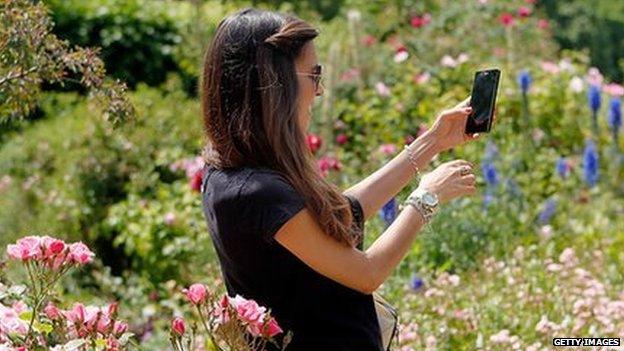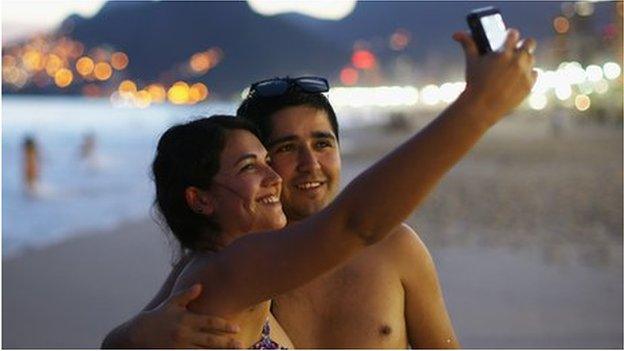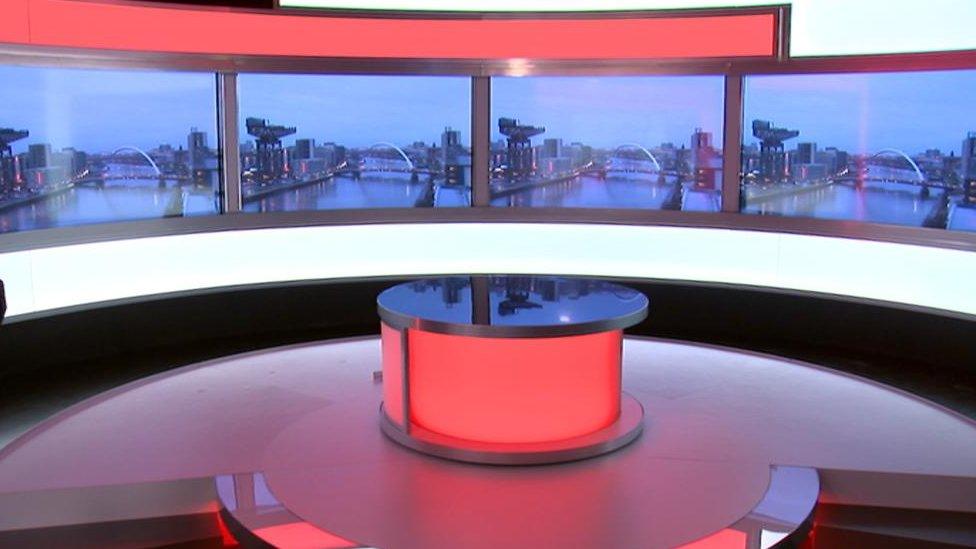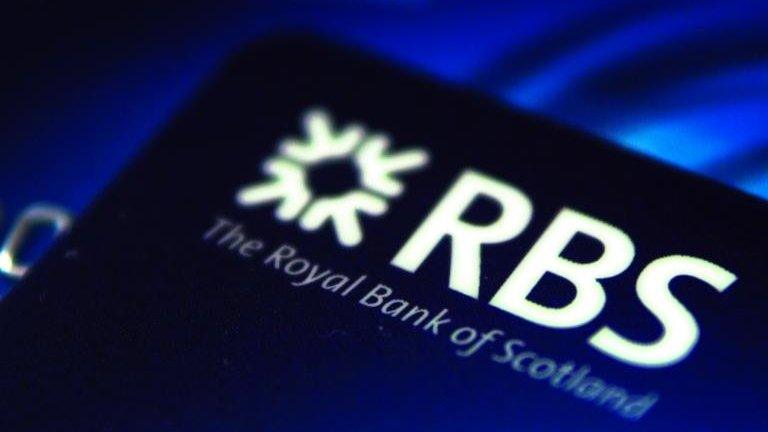The social media animal
- Published

One in 10 British adults said they took at least one selfie a week
Expect change. So don't be surprised to learn this week that the two bits of the UK car market to have grown fastest in the past 10 years have been super-minis, up 22% and sports utility, up 88%.
McDonald's is introducing table service. Brent crude is trading below $50 a barrel again. One in 10 people who were retired before the financial crash had returned to work after it.
But there can't be much that's changed more than our consumption of media.
The latest Ofcom survey of media use across Britain has defined it as a "smartphone society". That's where we're now getting digital, and websites are having to adapt. That's why the BBC news website, among many others, recently changed its look and is adaptable to different formats.
Even as the tablet computer has reached half of households - up from 1% in Scotland only four years ago - it is being overtaken as the medium of choice by the smartphone.
Screen time
But there's a lot more to it than that. Our consumption of media is taking up a staggeringly large share of our time. If you put them all together, it amounts to an average 11 hours 41 minutes per day.
We're quite often using different media at the same time - listening to radio while internet browsing, or watching TV or on another type of screen, while commenting on it using social media. So with that duplication, the time is spent is reckoned to be more like nine hours six minutes.

That comes from last year's Ofcom report into the media in Scotland, though the usage figures haven't been updated in the 2015 survey, out this week.
It showed four hours 44 minutes spent watching, mainly television; two hours 24 minutes communicating, with three times longer spent writing and texting messages than speaking; two hours 11 minutes reading or browsing, though only 2% of time was spent on print media; and one hour 55 listening to radio or music.
Communicating across different platforms is easier for the homes that have broadband, of course. Broadband take-up in Scotland was 73% according to the more recent Ofcom report, while the UK average was 80%.
In better-off households, Scotland matched the UK take-up of 88%, but in poorer ones, only 57% had broadband, compared with 68% in the same categories across the UK.
Reporting Scotland

Reporting Scotland has a 30% share of the audience in its time slot
The 2015 survey material is based on face-to-face interviews at the start of this year with 492 people in Scotland and 3,756 throughout the UK. That increases the margin of error for the Scots figures above the standard 3 points either way.
But what is suggested here is that Scots have been watching slightly less TV than shown in last year's report, down by seven minutes. That takes the average daily viewing just below four hours. That's 19 minutes more than the UK average.
Since a peak in 2011, the Scots average daily TV viewing has fallen by 28 minutes.
Scots have more time than the rest of the UK for early evening news. On BBC1, Reporting Scotland and STV News at Six go out at different times, but both get a bigger share of the total audience than their equivalents south of the border - 30% share for BBC1, 23% for STV.
The Border broadcasting area was the one part of Britain where the Channel 3 option out-performed the BBC1 offering, and by a wide margin.
Radio stars outlive video
In more detailed focus group research, Ofcom found 41% of those asked were watching less TV at the time of broadcast, with 40% more watching it on-demand.
More than a quarter were watching more TV series or box-sets in 2015 than 2014, it was found. But the DVD was fast falling out of favour, with 46% using them less, 44% going to the cinema less and 31% going out socialising less.
What we're doing more is using social media, and a lot of people admit to being hooked on it. Asked to rate their addiction rate, 23% said it was between seven and 10 out of 10, and the rest of the UK showed a similar pattern.
Scots listen to an average of nearly 20 hours a week of radio. Some 87% choose to listen to it, which is below the UK average.
We are more likely to be listening to commercial stations than the rest of Britain, for which Scottish stations are rewarded with more advertising revenue (£8 per head), while BBC Radio Scotland reaches one in five adults.
Friends and family
How do we communicate with friends and family? Ofcom's findings include something so astonishing that you have to doubt it.
Only 61% of Scots surveyed said they communicate with friends or family by meeting them face-to-face. That is, nearly two in every five us don't meet our friends and family from week to week. It's lower than other parts of the UK, but not by much. The average is 67%.
That's not because we have to: it's because we prefer to. Asked what the preferred method of communication is with family and close friends, less than seven in 10 of us say face-to-face.
Yet seven in 10 people agree with the statement: "People waste too much time on social media and it gets in the way of spending real time with real people". (No-one said public opinion had to be logical.)
Online dating
More credible is that the most common means of communication with friends and family is by text message, at 76% on a weekly basis. Email is regularly used by 72% in the UK.
More conventional technology, like the phone, is on 61%, with Scots slightly more likely to use social media and to comment on websites and forums (60% and 26%). It seems we're less likely than others to Tweet, at 13%, and only 10% of us post items to friends and family on at least a weekly basis.
So are Scots making new friends online? Less successfully than others. For instance, 15% have used an online dating website, and of them, only 40% have made new friendships that way - well below the 56% UK strike rate.
- Published4 August 2015
